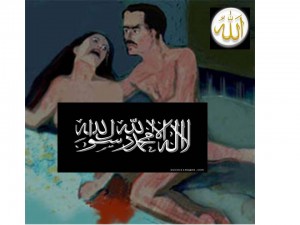A new film follows the harrowing true ordeal of a Pakistani family who dared to fight for justice after their daughter was gang raped.
When a girl was gang raped by four men at the age of 13, her village in Pakistan identified her as a “black virgin” and ordered her killed.

The film, Outlawed in Pakistan, shows how Kainat Soomro is still “destined to be killed” because she took the extraordinary step in Pakistan of fighting for justice. The film is a testament to her family’s strength and endurance in a life which has only become more difficult the longer they have stood up against tradition.
The Soomros have faced isolation, fear and intimidation from the four men Kainat accused of raping her, and from the members of the small village who were afraid of challenging moral laws which have been in existence for centuries. By the mere fact of having made the accusation of rape, Kainat is an outlaw in her own country.
The film, which was first screened at the 2013 Sundance Film Festival, retells the story of the young girl’s attack while walking home from school down a narrow village street by a shop where Kainat says the owner, Shaban Saikh, and three other men — including a father and son — held her down and sexually assaulted her.
The village declared her “kari,” or a black virgin, and ordered her family to carry out an honor killing to end the shame a rape victim brings to a family, according to Pakistani culture.
The alleged rapists beat her father and one of her brothers. Her older brother went missing for three months and was later found murdered.
Kainat’s parents refused to kill their daughter and instead decided to take up her cause in a legal system which places the burden of proof on the victim.
[youtube qxrlY1I9mc4 nolink]
“They told me I am not a real man,” Kainat’s brother, Sabir told the film-makers, “because you failed to follow your tradition, you failed to kill your sister.”
Meanwhile, threats of death and further violence have forced the Soomros from the house they owned in Dadu to the city of Karachi, where all 18 family members now live in a two-bedroom apartment.
The men are unable to find work, so the women embroider fabrics to pay rent. They often have to resort to asking charities for food.
When Kainat attends court she undergoes a barrage of “nasty” questions, up to 300 at a time, including “what part of your clothing did you remove?” or “who raped you first.”
The presiding judge is annoyed that Kainat has brought the charges and rules against her in part because she has accused a father and son of a gang rape. “In his view,” the film’s narrator says, “he said that would never happen in Pakistan” and describes Kainat’s accusations “as a product of her own fantasy.”
The men were acquitted of their crime, and, in an interview with the film makers, appear bewildered at why their accuser did not just stay at home “and keep quiet.” They see their acquittal as proof that Kainat “does not have good character. If she was a decent woman, she would have sat at home, silent.”










